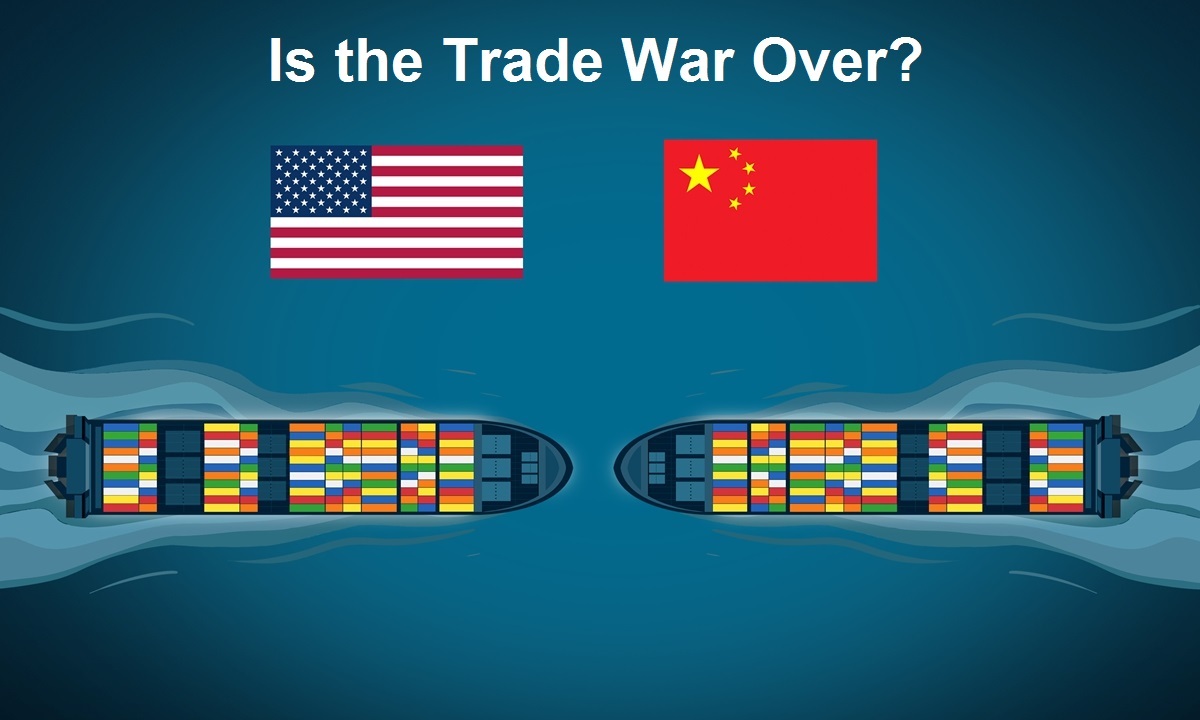by Brian Shilhavy
Editor, Health Impact News
News headlines today on an alleged U.S. – China trade agreement sent the Stock Market soaring today.
I found it rather curious that even though the trade agreement was reportedly finalized early yesterday (Sunday, May 11th), that both the U.S. and China stated that they would not release a joint statement until the next day, Monday (today).
Was it because they wanted their announcement to specifically have a positive impact on world stock markets? Was that part of the agreement?
The English language China news outlets did not even comment on the agreement until almost midnight in China today, coinciding with the opening of the U.S. stock markets.
But just taking China and the U.S.’s statements today at face value, there are still 30% tariffs on goods imported from China!
And yet investors are acting as if the trade war is over.
“Talk” is cheap, and anyone can say anything. But the proof of what is actually happening in the real world, lies in the traffic to U.S. ports, the availability of goods from China, and the price of those goods.
It is hard to trust anything Trump says on this issue, because he continually lies about the true nature of tariffs.
Just last week, Trump, once again from the White House while announcing the UK trade deal, repeated the LIE that consumers don’t pay for tariffs, “Countries and businesses do.”
Hear it from his own mouth, when a reporter asked him about Mattel and Ford raising their prices due to the tariffs.
As a business owner running a business for 23 years importing products, I can tell you that the country exporting the products DOES NOT PAY THE TARIFF!
Think about it. Why would they? How could the U.S. go into the ports of China, and into China’s government offices that control exports, and demand that they pay a tariff before shipping any products to the U.S.?
They cannot.
The tariff is collected by the U.S. Government when businesses (or sometimes consumers ordering direct) clear their imported goods through U.S. Customs.
The U.S. business (or consumer) pays all tariffs!
But Trump will demonize American businesses who tell the truth about this, as he has already done by publicly shaming U.S. businesses such as Amazon.com, Ford, Mattel, and others.
And while most investors were shouting for joy today in their rush to purchase stocks, there were a few who went against the tide to deal with actual facts, instead of hype.
Here is an article from MarketWatch apparently written by two Chinese reporters.
The stock market is cheering the U.S.-China trade deal, but the damage is done
Investors, policymakers and consumers have yet to reckon fully with the consequences of Trump’s actions
By Angela Huyue Zhang and S. Alex Yang
Excerpts:
The White House announced that the United States and China will temporarily suspend or lift the import tariffs they imposed on each other in April, pending further negotiations on a trade agreement.
But while the announcement offers long-awaited relief to businesses and has boosted market confidence, investors would be wise to curb their enthusiasm.
Taking cues from his background in business, President Donald Trump uses tariffs as a bargaining chip, seemingly convinced that aggressive escalation will force U.S. trading partners to offer significant concessions and enable him to declare a major political victory.
But negotiating a trade agreement is not the same as striking a real-estate deal. The process is slower, messier and far more consequential.
Today, even if tariffs are to be lifted in the short term, China has little reason to believe that the U.S. will honor its commitments or pursue meaningful enforcement, especially given the tremendous mistrust that Trump has sown.
Ultimately, any trade deal that the U.S. and China negotiate is likely to be fragile, limited in scope, and vulnerable to collapse. Businesses and investors should thus be prepared for continued disruptions across global supply chains.
In fact, Trump’s trade war has already done lasting harm to global supply chains. Retailers have been scrambling to cancel orders, manufacturers and distributors have rushed to reroute and stockpile inventories, and businesses have been operating in a climate of heightened uncertainty.
The disruption unleashed by Trump’s tariffs will not stop at the stock market; it will reverberate through factories, ports, and storefronts worldwide.
Investors, policymakers, and consumers have yet to reckon fully with the consequences of Trump’s actions. (Source.)
Angela Huyue Zhang and S. Alex Yang’s opinion that the “damage is already done” with these constantly shifting tariffs is backed up by announcements China made heading into the trade talks in Geneva this past weekend, as they are already redirecting their own imports of products they used to buy from the U.S., to purchase from other countries now.
China accelerates replacement of US products before China-US trade meeting: media
China and the US kicked off on Saturday a high-level meeting on economic and trade affairs in Geneva, Switzerland. The meeting will continue on Sunday, a CGTN report revealed on Sunday.
China moved to accelerate the replacement of US products before the high-level China-US trade talks in Switzerland, Yuyuantantian, a social media account affiliated with state broadcaster CCTV reported on Saturday.
China signed letters of intent with exporters of Argentina to purchase soybeans, corn, and vegetable oil shortly before the Geneva talks, according to Yuyuantantian. Rui Costa, chief of staff of the Presidency of Brazil, also visited China in late April, said the report.
Brazil expressed a desire to build sustainable, long-term, and actionable partnerships with China to jointly navigate an increasingly complex and volatile global environment, according to Yuyuantantian.
Earlier in April, China signed contracts to purchase at least 2.4 million tons of soybeans from Brazil—a volume equivalent to nearly one-third of China’s average monthly soybean imports, the Yuyuantantian report said.
Despite the headwinds posed by escalating US tariffs, China’s foreign trade performed better than expected in April.
According to data released by the General Administration of Customs, while exports to the US fell 21 percent year-on-year to about $33 billion last month, overall Chinese exports rose 8.1 percent, with exports to non-US markets increasing 13 percent. (Full article.)
The trade publication FreightWaves also reported today that they expected to see a surge in shipments now with the announcement of this “90-day pause” of most tariffs between China and the U.S., but that is assuming that businesses can handle the still existing 30% tariffs on goods from China.
I’m not so sure that is going to happen. But if at some point Trump completely changed his mind and dropped all tariffs, then the increase in transportation rates that FreightWaves discusses will certainly become a major issue.
Transportation rates likely to surge during tariff pause
U.S. and Chinese officials have reached an agreement to roll back most recent tariffs and implement a 90-day truce in their trade war to facilitate further negotiations. Announced in Geneva, this deal marks a significant step back from a conflict that has disrupted the global economy. The temporary suspension of hostilities is expected to have immediate effects on global shipping and transportation markets.
Current Freight Rate Forecast
Freight rates are projected to rise sharply in the coming weeks as importers rush to capitalize on this window of opportunity. The increases are expected to begin with ocean freight rates in the near term, followed by domestic trucking rates in July and August.
This surge stems from importers addressing existing backlogs and expediting new orders before potential policy changes at the end of the 90-day period.
This pattern echoes transportation capacity challenges observed in late 2021 and early 2022, as carriers seek to maximize pricing power during an anticipated surge in shipments.
Implications of the Tariff Suspension
This abrupt shift in trade policy is likely to create significant logistical challenges. Companies may struggle to secure containers in China and access truck or intermodal chassis capacity in the United States. Transportation capacity and infrastructure could be strained by the surge in shipping volume.
Larger, more consistent importers are likely to benefit most, as they typically receive preferential treatment from carriers when capacity tightens. Smaller shippers may face disadvantages, as transportation providers prioritize high-value customers and sideline inconsistent or lower-paying shippers. (Full article.)
For an accurate picture of how these tariffs are affecting businesses and consumers during this time, try to ignore the lies coming from the White House and their rhetoric, and keep an eye on shipping and supply routes, activity at the ports, and local logistics companies trucking goods through the U.S. supply chain.
I have to do that for my own company, and so far we have not had to raise any rates due to the tariffs, as we wait to see what we are actually going to be charged at customs when our next containers come into the ports in the next few weeks.
I can tell you that even without the tariffs, the price of many items are increasing.
For example, we buy green coffee beans that are tested for the presence of glyphosate, and usually buy the green beans from Guatemala. Once we find a batch that tests clean of herbicides and pesticides, we buy as much as we can, because green, non-roasted coffee beans can last indefinitely if stored properly.
The last time we ordered green coffee beans was over 2 years ago. Since that time, world coffee prices have dramatically increased and have actually doubled, mainly due to environmental factors.
We contacted our supplier who informed us they had green coffee beans in stock in the U.S. that have been stored in their warehouse before the tariffs kicked in.
But the price is still 65% higher than what we paid two years ago.
Likewise in the Philippines, they had a bad typhoon season at the end of 2024 making coconuts more scarce, with the price being almost 50% higher than last year, and that’s before counting tariffs which currently stand at 10%, but are scheduled to jump to 17% by summer.
American businesses are being hammered economically, and that is a fact.
Trump stating that consumers will not see price increases due to tariffs because the country the tariff is against, and the businesses who import the products from there, will eat those costs and not pass them on to consumers, is 100% a LIE.
And if any business calls him out on this lie, he will publicly shame them, attacking American businesses, the very businesses that this economy depends upon.
A house built upon a foundation of lies, is a house built on sinking sand. It will not stand.
“Therefore everyone who hears these words of mine and puts them into practice is like a wise man who built his house on the rock. The rain came down, the streams rose, and the winds blew and beat against that house; yet it did not fall, because it had its foundation on the rock.
But everyone who hears these words of mine and does not put them into practice is like a foolish man who built his house on sand. The rain came down, the streams rose, and the winds blew and beat against that house, and it fell with a great crash.” (Words of Jesus in Matthew 7)
UPDATE SINCE PUBLISHING THIS ARTICLE EARLIER TODAY:
The director of the Port of Los Angeles told The Wall Street Journal that despite the tariff reduction, he does not expect a sharp increase in imports, and projected a 25% year-over-year drop in import volume at the Port of L.A. this month.
From Los Angeles Daily News:
The U.S. will drop its tariff rate on Chinese goods from 145% to 30%, while China plans to reduce its tax on American imports from 125% to 10%, effective as soon as Wednesday.
“The 90-day pause and reduction of tariffs between the United States and China is welcome news for consumers, American businesses, workers and the supply chain,” Gene Seroka, executive director of the Port of Los Angeles, said in a statement posted on X.
“Even with this announcement, tariffs remain elevated compared to April 1.”
Seroka called for both nations to work toward a long-term agreement and urged the U.S. to engage other countries in reducing existing tariffs.
He told The Wall Street Journal that despite the reduction, he does not expect a sharp increase in imports, and projected a 25% year-over-year drop in import volume at the Port of L.A. this month.
Port and city officials held a news conference in Long Beach Monday to highlight the results of a new economic impact analysis covering the last five years. While officials hailed the port’s success, it was undercut by President Donald Trump’s tariffs, which were enacted in April.
“But the fact of the matter is uncertainty remains, and I think what this industry is calling for is that we have certainty and clarity with regard to what that tariff policy looks like in the mid- and long term,” Cordero said.
He noted that the tariffs are impacting various commodities such as refrigerators, computers, smart phones, microwaves and televisions.
“With significantly reduced cargo volumes, it’s likely that the consumer will have fewer choices,” Cordero added.
Gary Herrera, president of International Longshore Warehouse Union (ILWU) Local 13, representing nearly 9,000 full work and 6,000 part-time dockworkers, discussed the impact tariffs have on jobs.
“We’re seeing cargo volumes drop to record lows to the point where there (are) hundreds of jobs daily with less work opportunities afforded to the men and women with ILWU,” Herrera said. “We are the front-liners. Once the cargo volumes drop, we’re the first to see it.”
Part-time members are forced to find other jobs or work in different industries, Herrera said.
“We’re hoping for some real numbers, some real agreements that are signed and dated and move us forward — not with pauses,” Herrera said. (Source.)
Comment on this article at HealthImpactNews.com.
This article was written by Human Superior Intelligence (HSI)
See Also:
Understand the Times We are Currently Living Through
New FREE eBook! Restoring the Foundation of New Testament Faith in Jesus Christ – by Brian Shilhavy
Who are God’s “Chosen People”?
KABBALAH: The Anti-Christ Religion of Satan that Controls the World Today
Christian Teaching on Sex and Marriage vs. The Actual Biblical Teaching
Exposing the Christian Zionism Cult
The Bewitching of America with the Evil Eye and the Mark of the Beast
Jesus Christ’s Opposition to the Jewish State: Lessons for Today
Identifying the Luciferian Globalists Implementing the New World Order – Who are the “Jews”?
The Brain Myth: Your Intellect and Thoughts Originate in Your Heart, Not Your Brain
What is the Condition of Your Heart? The Superiority of the Human Heart over the Human Brain
The Seal and Mark of God is Far More Important than the “Mark of the Beast” – Are You Prepared for What’s Coming?
The Satanic Roots to Modern Medicine – The Image of the Beast?
Medicine: Idolatry in the Twenty First Century – 10-Year-Old Article More Relevant Today than the Day it was Written
Having problems receiving our emails? See:
How to Beat Internet Censorship and Create Your Own Newsfeed
We Are Now on Telegram. Video channels at Bitchute, and Odysee.
If our website is seized and shut down, find us on Telegram, as well as Bitchute and Odysee for further instructions about where to find us.
If you use the TOR Onion browser, here are the links and corresponding URLs to use in the TOR browser to find us on the Dark Web: Health Impact News, Vaccine Impact, Medical Kidnap, Created4Health, CoconutOil.com.





















